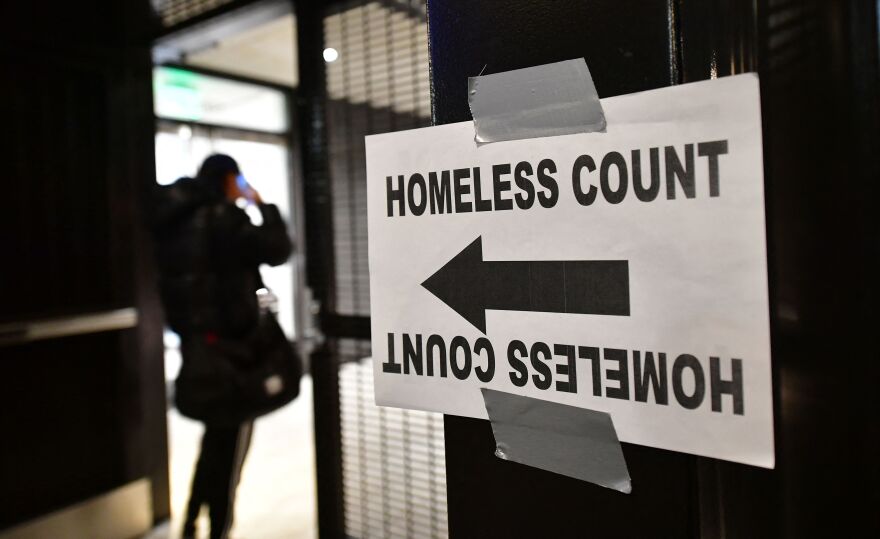Congress has cut federal funding for public media — a $3.4 million loss for LAist. We count on readers like you to protect our nonprofit newsroom. Become a monthly member and sustain local journalism.
Are Unhoused Latinos Being Left Out Of The Picture? A New Effort To Make Sure The Count Is Accurate

Getting an accurate count of unhoused people in Los Angeles County is tricky, as experts caution many communities — among them, Latinos — may be undercounted.
Now a team of researchers funded by UCLA is developing a new methodology to better reflect Latino populations experiencing homelessness.
-
That's when people within a community who are experiencing homelessness are counted on a single night.
“Part of the project is to explore different ways that we can measure homelessness, alternative ways to the point-in-time count that would be better at capturing the experiences of the Latino community,” said Melissa Chinchilla, one of the research scientists working on the team.
At issue, said Chinchilla, is how the question is asked. She said the Latino population experiencing homelessness is likely to be underestimated in traditional counts. That's because many may not identify themselves as experiencing homelessness, or they live with friends and family sharing overcrowded housing (a situation referred to as “doubling up”).
When Latinos double up, they don’t get counted, Chinchilla said.
How The Annual Count Works
This year, the Los Angeles Homeless Services Authority resumed its annual homeless count after a one-year hiatus due to the COVID-19 pandemic. For three nights starting on Feb. 22, volunteers, service workers, and formerly unhoused people went out into the community to physically count the homeless population. The results are expected in early September.
The current methodology centers on counting people who LAHSA calls “literally homeless” on the nights of the census. That designation includes those who sleep in a homeless shelter or temporary living quarters like a sidewalk encampment or a car. This methodology is called a point-in-time count.
Who Doesn't Get Counted
The drawback of counting those who are “literally unhoused” is that people who are living in a motel or sleeping on the couch of friends and families are not counted.
“Some of what we know from previous work is that oftentimes with the Latino community they pull on their social network,” said Chinchilla. “Like family and friends, and also informal supports that are not captured in the homeless service system — for example, churches.”
Chinchilla and her team will also focus their project on the different housing resources available and if those resources are accessible to the Latino community. Through their research, Chinchilla observed that Latinos experiencing homelessness will go through community members to access resources.
Next Steps
Chinchilla said the teams wants to know what is stopping Latinos from going directly to city-provided services.
“Why aren’t people accessing these resources? Is it because there’s a language barrier? Is there a cultural barrier? Do they not identify themselves as experiencing homelessness? Is there a different way that our community thinks about housing?” said Chinchilla.
Chinchilla and her team received funding from the UCLA Latino Policy & Politics Institution to move forward with their project. The team's findings will be developed into public policy briefs to inform local and state policymakers on how to better serve the Latino communities.
As Editor-in-Chief of our newsroom, I’m extremely proud of the work our top-notch journalists are doing here at LAist. We’re doing more hard-hitting watchdog journalism than ever before — powerful reporting on the economy, elections, climate and the homelessness crisis that is making a difference in your lives. At the same time, it’s never been more difficult to maintain a paywall-free, independent news source that informs, inspires, and engages everyone.
Simply put, we cannot do this essential work without your help. Federal funding for public media has been clawed back by Congress and that means LAist has lost $3.4 million in federal funding over the next two years. So we’re asking for your help. LAist has been there for you and we’re asking you to be here for us.
We rely on donations from readers like you to stay independent, which keeps our nonprofit newsroom strong and accountable to you.
No matter where you stand on the political spectrum, press freedom is at the core of keeping our nation free and fair. And as the landscape of free press changes, LAist will remain a voice you know and trust, but the amount of reader support we receive will help determine how strong of a newsroom we are going forward to cover the important news from our community.
Please take action today to support your trusted source for local news with a donation that makes sense for your budget.
Thank you for your generous support and believing in independent news.

-
Kimmel returned less than a week after ABC suspended his show over comments he made about the assassination of right wing activist Charlie Kirk.
-
Southern California might see some light rain tonight into Wednesday morning. After that, cooler weather is on the way, but expect the humidity to remain.
-
A gate tax at Disney? It's a possibility.
-
UCLA and University of California leaders are fighting Trump’s demands for a $1.2 billion settlement over a litany of accusations, including that the campus permits antisemitism.
-
Wasteland Weekend is all about souped-up rust buckets, spikey costumes and an ‘ideal apocalypse.’
-
The Shadow the Scientists initiative at UC Santa Cruz strives to demystify astronomical research.







